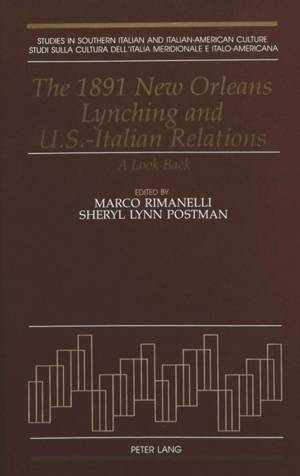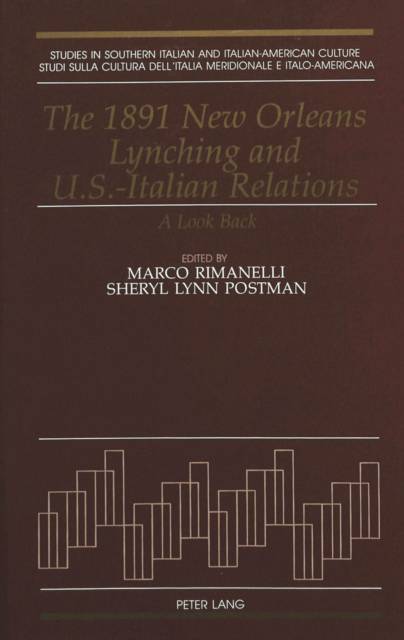
Je cadeautjes zeker op tijd in huis hebben voor de feestdagen? Kom langs in onze winkels en vind het perfecte geschenk!
- Afhalen na 1 uur in een winkel met voorraad
- Gratis thuislevering in België vanaf € 30
- Ruim aanbod met 7 miljoen producten
Je cadeautjes zeker op tijd in huis hebben voor de feestdagen? Kom langs in onze winkels en vind het perfecte geschenk!
- Afhalen na 1 uur in een winkel met voorraad
- Gratis thuislevering in België vanaf € 30
- Ruim aanbod met 7 miljoen producten
Zoeken
The 1891 New Orleans Lynching and U.S.-Italian Relations
A Look Back
€ 69,95
+ 139 punten
Omschrijving
On the centenary of the 1891 New Orleans Crisis and U.S.-Italian war-scare, this authoritative study by Marco Rimanelli and Sheryl L. Postman represents the latest, and most complete and objective socio-politico-literary study of that period. Although long forgotten, this key domestic and diplomatic crisis exposed in a flash of violence all the simmering anti-Italian racial tensions rocking New Orleans and America. Ethnic hostility toward southern Italian immigration and Mafia criminality exploded in New Orleans with the murder of Police Chief D.C. Hennessy and the lynching by a 20,000-strong mob of 11 imprisoned Italians. Far from being spontaneous, the lynching was secretly engineered by Lousiana's establishment in a strategy to exterminate the Mafia, expropriate the rich Italian tropical fruit trade with Central America, and especially, cajole the independent-minded Italians into joining the White Supremacist front, which disenfranchised Louisiana's Blacks in 1898. Nationally, the lynching split Americans between advocates and opposers of popular justice and anti-immigration laws. Even more importantly, the New Orleans Lynchings provoked a major international crisis and war-scare with Italy in 1891-92, while promoting at home the long awaited nationalistic Reunification of North and South against foreign foes. The U.S. government's refusal to pay reparations until 1892 led Italy to break diplomatic relations, while both governments were trapped in a rigid international confrontation by their own domestic political fragility and collapsing electoral support. Finally America's own defenselessness against Italy's navy (The world's third largest) forced the U.S. to build a new modern navy, which first propelled them to victory in the 1898 Spanish-American War, and later on to global Superpowership.
Specificaties
Betrokkenen
- Uitgeverij:
Inhoud
- Aantal bladzijden:
- 425
- Taal:
- Engels
- Reeks:
- Reeksnummer:
- nr. 2
Eigenschappen
- Productcode (EAN):
- 9780820416724
- Verschijningsdatum:
- 1/05/1992
- Uitvoering:
- Hardcover
- Formaat:
- Genaaid
- Afmetingen:
- 312 mm x 163 mm
- Gewicht:
- 739 g

Alleen bij Standaard Boekhandel
+ 139 punten op je klantenkaart van Standaard Boekhandel
Beoordelingen
We publiceren alleen reviews die voldoen aan de voorwaarden voor reviews. Bekijk onze voorwaarden voor reviews.








